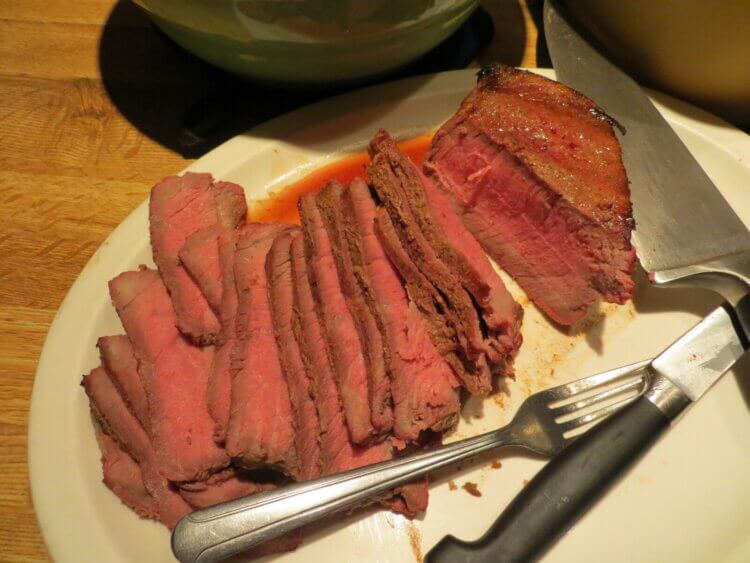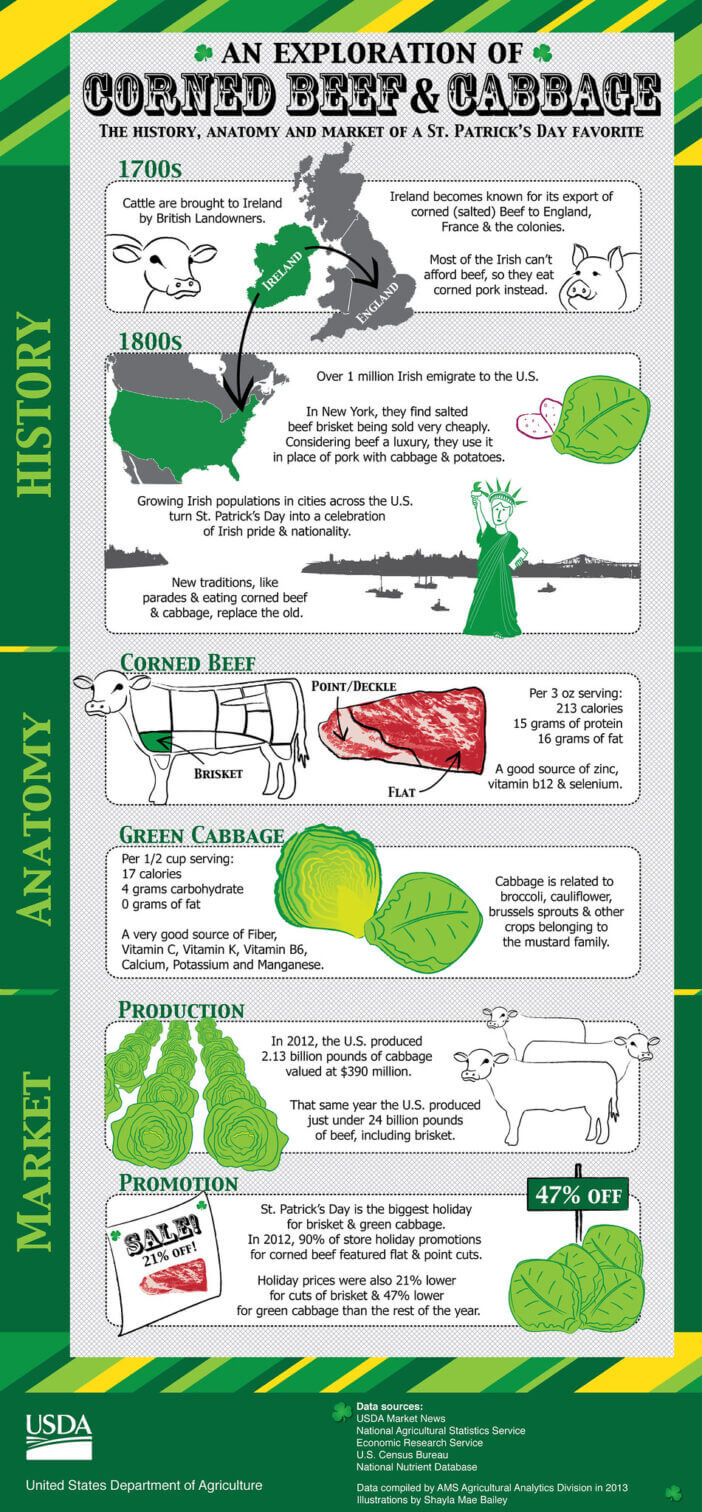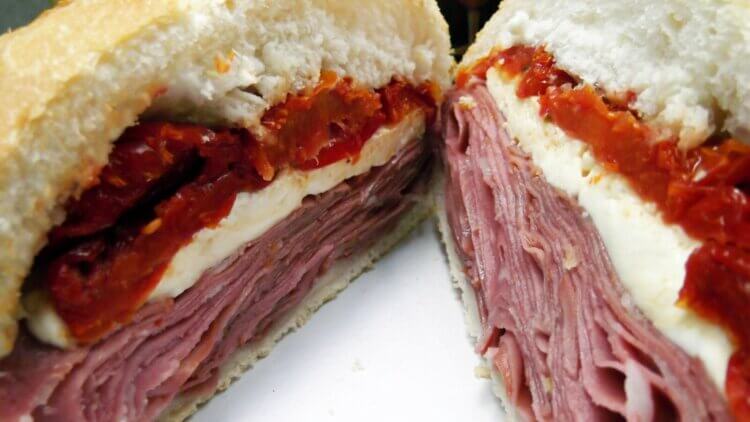The traditional St. Patrick’s Day meal includes corned beef just as Patricks Day feast as cabbage and green beer. This meat is salty by definition. The large salt pieces (referred to as “corns” of salt) used in the curing process are what the word “corn” in the name actually refers to. Although it is impossible to completely remove the salt from corned beef, there are techniques you can employ to lessen its salty flavor.
Before cooking, let the corned beef soak for 12 to 24 hours in cold water or milk. Throughout this procedure, keep it in the refrigerator, and frequently replace the liquid. Before cooking, remove as much liquid as you can from the meat.
Add sugar to the dish containing the corned beef. Start with half a teaspoon per pound of corned beef and gradually add more while frequently tasting the dish; do not use enough to actually make the dish taste sweet. The sugar can assist in lowering the beef’s salty flavor. If the dish begins to taste sweet, stop adding sugar and try another method instead.
Include more of the other ingredients used in the dish. For instance, if you are making a stew with potatoes, carrots, and corned beef, increase the amount of the vegetables without changing the proportion of the corned beef. If more ingredients are added without more salt, the overall saltiness of the dish will decrease.
Incorporate dairy into the dish, if possible. Adding cream to corned beef stew or serving corned beef with creme fraiche are two options. Take note that this trick reduces both spiciness and saltiness. To counteract the effects of the dairy, you might need to add more of the spices if your dish is meant to be spicy.
Four Ways to Reduce the Saltiness of Corned Beef

Soaking the Beef in Water
Soaking the raw meat in water to remove the salt from your corned beef is the simplest method. This will take some time, but it is very simple. Simply remove the beef’s wrapping and drain the pickling juices from the package.
Place it in a sizable bowl or pot after giving it a quick rinse under running water. Place the entire package back in the refrigerator after covering the beef with cool water.
Remove the corned beef and drain the water after four hours. Add some more water and repeat the same process.
Do this a third time. Your beef is now ready for preparation, and most of the flavor from the excessive salt has been washed down the drain.
Cook Corned Beef Low and Slow Covered in Water
The cooking process will leach out most of the salt from the beef if you simmer it. Place the thoroughly rinsed beef in a pot and fill it with ice water.
With a tight-fitting lid on the pot, place the meat on the stove and let it simmer for three to four hours. As the meat cooks on the stove, the salt will evaporate from it.
Make sure to periodically check the meat to make sure the cooking liquid is covering it.
After several hours, you’ll have delicious and tender corned beef. All of the excess salt will be removed with the cooking water when it is drained. Alternatively, you could prepare the meat in a slow cooker.
Add Interesting Seasonings or Sauces
Is it a lost cause if you tried everything above and your corned beef still tastes too salty? Not necessarily. You can still cook your meat and enjoy a satisfying meal. Did you know that something tart or sour can deceive your taste buds into thinking it is not too salty?
You likely won’t be able to detect the excessive saltiness of the meat if you serve your corned beef with mustard, pickles, or some sort of relish.


A traditional favorite that is frequently served with corned beef is sauerkraut. You can use it in a hearty stew or with a starchy carb like a potato for a satisfying meal.

If your corned beef is overly salty, you might want to try it again after it has been refrigerated (after cooking corned beef, of course).
Perhaps you should thinly slice it and put it on a sandwich with some condiments. It’s likely that once the meat is on a sandwich, you won’t even notice how salty the meat is.
Where’s the Corn in Corned Beef?
Perhaps you’ve noticed that corn isn’t present in corned beef. In the past, the term “corn” referred to more than just the yellow grain that grew on stalks.
It also referred to anything roughly the size of a corn kernel, such as the salt cubes used to brine and preserve beef brisket. Beef that had been preserved with salt chunks the size of corn kernels was known as corned beef.
The chunks of salt prohibited bacterial growth and kept the meat from spoiling very quickly. In the days before refrigeration or freezing was available, preserving meat by pickling, brining, and drying were the only options to keep meat safely preserved for more than a few days.
What’s the Irish Connection?
The origin of the question, which dates back to when the Irish first immigrated to America, is whether or not the Irish actually ate corned beef in Ireland.
Before arriving in America, they were not used to eating corned beef. In Ireland, cheap cuts of pork like bacon were consumed by the common people, while beef was sold for cash.
But when the Irish immigrated to America, they discovered that corned beef was considerably less expensive than the pork they were accustomed to eating. Because so many Irish people lived in poverty, they opted to eat corned beef.
Additionally, cabbage and corned beef were frequently served together due to poverty. They chose to serve cabbage with their corned beef because it was another inexpensive food in the United States.
Despite the fact that these foods are relatively cheap, they were actually very nourishing for the Irish immigrants. Cabbage contains plenty of fiber, vitamins, and minerals and beef is high in protein and contains zinc, B Vitamins, and potassium.
How Do You Cook Corned Beef?
After you have soaked your corned beef you have several options for how to prepare it.
Preheat the oven to 350 degrees. Take the corned beef out of the soaking liquid and discard it. Pat the meat dry with a paper towel.
Using foil, line a 9 by 13 baking dish. The foil should be big enough to wrap around the meat like a packet.
Put the meat in the pan with the fatty side out and mustard all over it. Sprinkle the meat with the corned beef’s included seasoning packet.
Fold the foil over the meat, wrapping it tightly. Bake the meat for 1 hour per pound. When the meat is finished cooking, remove the packaging and finish cooking it under the broiler until it is crispy and golden. Slice the meat across the grain and serve.
Using a Slow Cooker
Take the corned beef out of the soaking liquid, then discard the liquid. Sprinkle the spice packet, 2 tablespoons brown sugar, and 2 teaspoons minced garlic over the meat before placing it in a slow cooker. Add 2 cups of beef broth or Guinness beer.
Put the slow cooker’s lid on and cook the meat for 4 to 5 hours on low. Add a pound of baby potatoes and three to four whole, peeled carrots to the meat.
Cook it for another 3 hours. Before slicing the meat and serving it with the potatoes and carrots, remove it from the slow cooker and let it stand for approximately 15 minutes. This will also help your corned beef not get overcooked.
In a Dutch Oven
Drain the corned beef’s soaking water before cooking it with cabbage in a Dutch oven. The bottom of the Dutch oven should contain 2 large red potatoes with their skins on. Add 1 chopped onion and 3 peeled chopped carrots.
Add the meat. Pour in 24 ounces of beer or beef broth. Sprinkle the spice packet over the meat. The meat should be partially sticking out of the liquid and mostly submerged in it.
Bake the Dutch oven at 350 for two hours with the lid on. Four pieces of a head of cabbage should be cut up and added to the pot with the meat and vegetables.
Put the pot’s lid back on and continue baking it for an additional hour. Before slicing the meat and serving it with the vegetables, remove the pot from the oven and let the meat rest on a cutting board for 15 minutes.
FAQs About Salty Corned Beef
Here are a few FAQs about Salty Corned Beef.
What do I do if my corned beef is too salty?
You can try soaking your corned beef in cold water for a few hours if it’s too salty. To lessen the saltiness, you can also boil the beef in fresh water. Finally, to improve the flavor of the meat, use a marinade or sauce.
How do you fix salty brisket?
Soaking a salty brisket for several hours in cold water is one way to fix the problem. Another choice is to cook the meat for several hours in fresh water to make it more tender. You could also experiment with various seasonings to mask the salty flavor.
Is brisket a salty meat?
Although brisket is not a particularly salty meat, corned beef can become salty when it is cured in a brine or pickling solution. You can always rinse and soak your corned beef in cold water for 30 minutes before cooking if you’re worried about its saltiness.
Does salt dry out brisket?
Yes, salt does dry out brisket. However, the brine provides all the moisture and flavor that it requires, which cannot be obtained through simple seasoning.
Mistakes Everyone Makes When Cooking Corned Beef And Cabbage
FAQ
How do you get salt out of corned beef?
Before cooking, let the corned beef soak in warm water for at least two hours. This will facilitate the removal of copious amounts of salt used in the preparation of corned beef. We recommend letting it soak 30 minutes for every pound.
Is corned beef supposed to be so salty?
Approximately 285 calories and 1,286 milligrams of sodium are found in a four-ounce serving of corned beef. That is more than half of the daily recommended sodium intake.
What happens if you don’t rinse corned beef?
1. Not Rinsing the Meat Before Cooking. You might end up with a saltier meal than you anticipated if you cook the meat straight from the plastic packaging or remove it from the brine solution in the refrigerator without first rinsing it.
Why does corned beef taste salty?
This meat is salty by definition. The large salt pieces (referred to as “corns” of salt) used in the curing process are what the word “corn” in the name actually refers to. Although it is impossible to completely remove the salt from corned beef, there are techniques you can employ to lessen its salty flavor.
